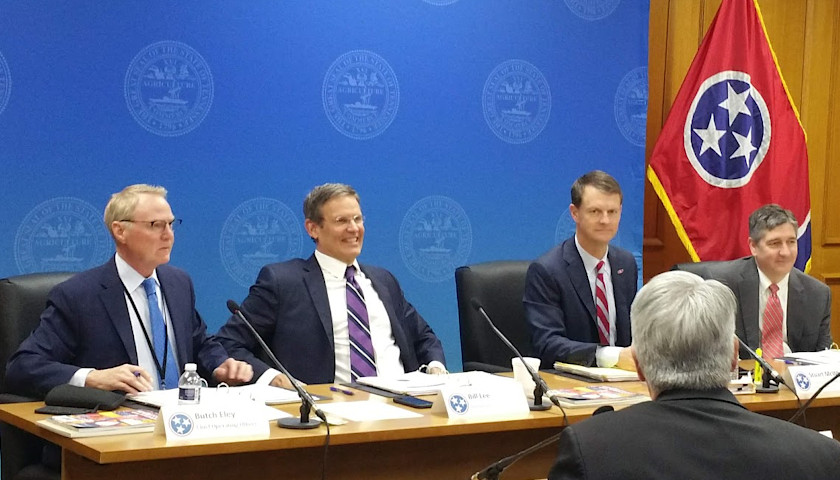NASHVILLE, Tennessee – In the second of four days of cabinet budget meetings for the 2019-2020 fiscal year, Governor Bill Lee explained that his request for budget cuts is a signal that what they are looking in his new administration is ways to find efficiencies, so that funding can be redirected towards things that are really important.
Lee went into the budget process in his first week as the 50th Governor of Tennessee with meetings scheduled with 25 departments between Friday, January 25, and Wednesday, January 30, and a request for departments to cut two percent from their budgets.
Joining him for the budget presentations was his Chief Operating Officer, Butch Eley; Commissioner of Finance and Administration, Stuart McWhorter; as well as Finance and Administration’s David Thurman.
After hearing from nine departments on Monday, which represents more than half of the state’s appropriations, Governor Lee clarified for the press that the cuts are not to cut services. Rather, “It’s to be better stewards of the taxpayer money itself.”
The cuts from inefficiencies would then be applied to “the places that are really important.”
Governor Lee said that the budget process “allows us to think through what we need versus what we want, and invest in those things that are most important to us. That’s what we’ll be doing after we gather all of this information that’s being presented.”
“We’re in a really good fiscal position, talking about even having the opportunity to invest in things that are the most important.”
The discussion of things that are important was clear from the presentations from the departments of Children’s Services, Human Services, as well as Mental Health and Substance Abuse Services, serving the “most vulnerable population,” which Governor Lee said, “We will work to make certain is well served.”
The Governor also acknowledged the opioid epidemic that is making the situation worse, and shows up in multiple departments, including the three aforementioned as well as Safety.
“That’s one of the things that I’ve seen the last couple of days of presentations, is the opportunity for departments to work together to address some of these situations.”
Indeed, many departments that presented on Monday relayed in their 30-minute allotted time the coordination between departments, the positive outcomes of such coordination and the plans to continue and enhance those efforts.
In addition to dealing with the challenges of potential federal funding cuts for the departments of Children’s Services and Transportation, increased funding is needed to address the growth in the number of children in foster care as well as about 33,000 uninsured Tennesseans in need of services from the department of Mental Health and Substance Abuse who do not qualify by virtue of being above the 100 percent federal poverty level.
About finding resources to better fund the safety net, Lee said, “That’s something that I would like to do. We’ll see if it’s possible.”
Under the education umbrella, increased funding for school safety and teacher pay had not been addressed in the Department of Education budget request.
With regard to school safety, Governor Lee emphasized, “We need to keep our kids safe.” He went on to explain, “That’s the reason I asked about the way the school safety funding has been distributed. I’m interested in how it is we do an even better job of that, that we make certain that we direct our funding and spend the appropriate dollars necessary to keep our kids.”
On teacher pay, Governor Lee said that while, “It’s too early to have specifics around that right now,” he offered, “We will obviously invest in the classroom, and that includes teachers.”
In addition to the funding requested by his department heads, some of which were increases, Governor Lee has a vision espoused during his primary and general election campaign including career, technical and agricultural education as well as helping Tennessee’s 15 distressed rural counties.
On taxes, Lee said, “My thought around taxes is that any time we can reduce them, we should try to do that. So, I will always be looking and will continue to look at opportunities to reduce taxes.” Specific to the internet sales tax, Lee said it had already been levied, just not collected, and committed, “We will look at the revenue streams that that creates, and see if there’s opportunities to cut taxes as well.”
Budget hearings continue on Tuesday with eight more departments, including TennCare, and conclude on Wednesday, with three departments.
Videos on the budget hearings for 2019-2020 can be found here.
– – –
Laura Baigert is a senior reporter with The Tennessee Star.






Dear Governor Lee,
If you want to start saving money immediately, start looking at the Executive Service Rows at TDEC. It nothing but a den of cronyism from the former administration. TDEC Water Resources has at least four Executive Service Fellows with no Direct Reports just running around pretending to look busy making an average of $8000 per month per employee. Many of the executive service people were cronies of Shari Meghreblian. One of these employees even went around with Shari Meghreblian lobbying for her reappointment with legislator on taxpayer’s time. That is a violation of the Mini Hatch Act. Not to mention, some of these executives have taken free paid vacation to China on state time. This is nothing but a freaking Boondoggle! Taxpayer don’t need to pay for these freeloaders.
Governor Lee – How about just cutting the outrageous cost of unnecessary government operations and put the money when it belongs – back in the pocket of the taxpayers who are footing the bill by simply cutting taxes? For example, repeal the so-called “IMPROVE” legislation that hits the pocketbook of every motorists.